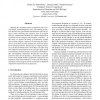Free Online Productivity Tools
i2Speak
i2Symbol
i2OCR
iTex2Img
iWeb2Print
iWeb2Shot
i2Type
iPdf2Split
iPdf2Merge
i2Bopomofo
i2Arabic
i2Style
i2Image
i2PDF
iLatex2Rtf
Sci2ools
BIBM
2008
IEEE
2008
IEEE
Predicting Protective Linear B-Cell Epitopes Using Evolutionary Information
Mapping B-cell epitopes plays an important role in vaccine design, immunodiagnostic tests, and antibody production. Because the experimental determination of B-cell epitopes is time-consuming and expensive, there is an urgent need for computational methods for reliable identification of putative B-cell epitopes from antigenic sequences. In this study, we explore the utility of evolutionary profiles derived from antigenic sequences in improving the performance of machine learning methods for protective linear B-cell epitope prediction. Specifically, we compare propensity scale based methods with a Naive Bayes classifier using three different representations of the classifier input: amino acid identities, position specific scoring matrix (PSSM) profiles, and dipeptide composition. We find that in predicting protective linear B-cell epitopes, a Naive Bayes classifier trained using PSSM profiles significantly outperforms the propensity scale based methods as well as the Naive B...
| Added | 29 May 2010 |
| Updated | 29 May 2010 |
| Type | Conference |
| Year | 2008 |
| Where | BIBM |
| Authors | Yasser El-Manzalawy, Drena Dobbs, Vasant Honavar |
Comments (0)

